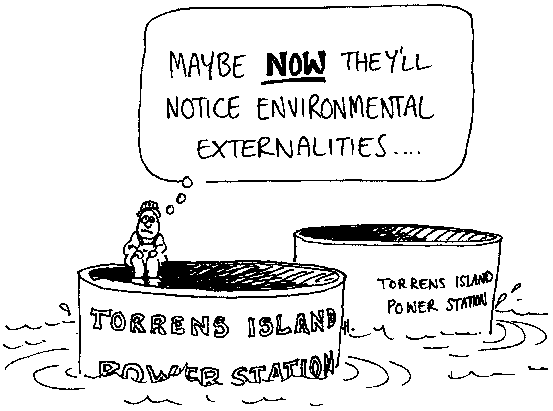
"All side-effects are effects."
Garrett Hardin
EXTERNALITY
An economic side-effect; the by-product of a market failure.
Externalities are costs or benefits arising from an economic activity that affect somebody other than the people engaged in the commercial exchange or financial activity and are not reflected fully in the expenses, costs, charges, or expenditures for purchases related to those economic transactions or commercial actions.
Thus PRICES do not reflect the charges levied or the benefits received in the exchange for all affected parties to the exchange of goods or services.
For instance, smoke pumped out by a factory may impose clean-up costs on nearby residents; bees kept to produce honey may pollinate plants belonging to a nearby farmer, thus boosting his crop. The factory pollution is an example of a negative or costly externality, while the bees kept for pollination benefiting other orchard owners are an example of a beneficial, or positive externality.

Cartoon: rising sea levels due to ocean thermal expansion are a by-product of burning fossil fuels for electrical power supply. For coastal property owners a rising sea level is a negative externality, but for fishermen this could be a positive externality!
Because these costs and benefits do not form part of the calculations of the people deciding whether to engage in the economic activity they are a form of MARKET FAILURE, since the amount of the activity carried out if left to the free market will be an inefficient use of resources. If the externality is beneficial, the market will provide too little; if it is a cost, the market will supply too much.
According to the Coase theorem (named after a Nobel prize-winning economist, Ronald Coase), it does not matter who has ownership, so long as property rights are fully allocated and completely free trade of all property rights is possible.
When a market left to itself does not allocate resources efficiently. Interventionist politicians usually allege market failure to justify their interventions. Economists have identified four main sorts or causes of market failure.